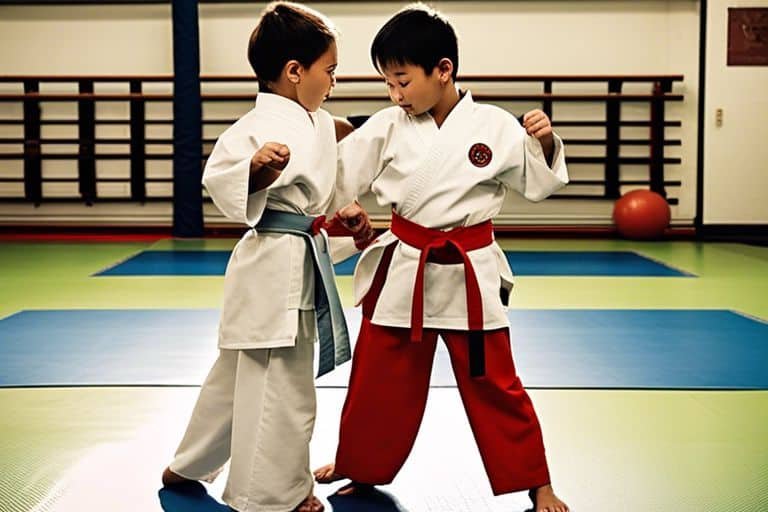If you’re looking for a children’s karate instructor, it’s crucial that you’re able to identify the signs of a good instructor to ensure that your child receives the best possible training. A good children’s karate instructor should possess a combination of experience, patience, and dedication to their students. Additionally, effective communication and a focus on safety are key indicators of a high-quality instructor. Keep reading to learn more about what qualities to look for when choosing a children’s karate instructor.
Key Takeaways:
- Experience: A good children’s karate instructor will have years of experience in teaching and practicing karate, as well as specific experience working with children.
- Patience: Patience is a key trait for a children’s karate instructor, as they will need to work with students of varying abilities and learning styles, and be able to provide constructive feedback in a positive manner.
- Effective communication: The ability to clearly communicate instructions and demonstrate techniques is essential for a children’s karate instructor, as is the ability to connect with and motivate young students.
- Safety-conscious: A good children’s karate instructor will prioritise the safety of the students, and have a thorough understanding of proper techniques and safety protocols to prevent injuries.
- Positive role model: A good instructor will embody the values of karate, such as discipline, respect, and perseverance, and will instill these values in their students through their own actions and behaviour.

Essential Qualities of a Good Karate Instructor
When it comes to choosing a children’s karate instructor for your child, it’s important to consider a number of key qualities that make a good instructor. These essential qualities ensure that your child receives the best instruction possible and has a positive experience learning karate.
Patience and Understanding
A good children’s karate instructor understands that children learn at different paces and have varying levels of physical and mental development. Patience and understanding are essential qualities for an instructor to possess, as they allow the instructor to tailor their teaching approach to each child’s individual needs. A patient and understanding instructor will provide the support and encouragement necessary for every child to progress at their own pace, creating a positive and inclusive learning environment.
Effective Communication Skills
Effective communication is key to successful teaching, especially when working with children. A good karate instructor possesses clear and concise communication skills, enabling them to effectively explain and demonstrate karate techniques in a way that is easily understandable for children. By being able to effectively communicate with their students, an instructor can ensure that each child grasps the concepts being taught and can perform the techniques correctly and safely.
Demonstrated Mastery of Karate Techniques
It goes without saying that a good children’s karate instructor must have demonstrated mastery of karate techniques. This not only includes technical proficiency but also an in-depth understanding of the principles and philosophies of karate. A knowledgeable instructor is able to impart their expertise to their students, setting a strong example and providing inspiration for aspiring young martial artists.
Recognizing a Child-Focused Teaching Approach
When looking for a children’s karate instructor, it’s crucial to find someone who employs a child-focused teaching approach. This means that the instructor tailors their teaching methods and content to suit the needs and capabilities of the young students. Here are a few signs to look out for.
Age-Appropriate Instruction
A good children’s karate instructor understands that children of different ages have varying levels of physical and cognitive development. They should be able to adapt their teaching style and techniques to suit the age group they are working with. This might involve using simpler language and explanations for younger children, and introducing more complex techniques to older ones. Additionally, they should be patient and understanding, allowing each child to progress at their own pace.
Fostering a Positive Learning Environment
One of the most important signs of a good children’s karate instructor is their ability to create a positive learning environment. This includes encouraging and praising the children for their efforts, as well as providing constructive feedback in a supportive manner. A positive learning environment also involves instilling a sense of discipline and respect in the students, while also making the classes fun and engaging. A skilled instructor will be able to strike a balance between discipline and enjoyment, keeping the children focused and motivated.
Assessing the Instructor’s Ability to Promote Discipline and Respect
When evaluating a children’s karate instructor, it is crucial to consider their ability to promote discipline and respect within the class. A good instructor should not only be able to teach karate techniques, but also instil important values in their students, such as discipline and respect. Here are some key aspects to look out for when assessing the ability of a karate instructor to promote discipline and respect.
Discipline and Structure in Class
A good children’s karate instructor will create a structured and disciplined environment in the class. This includes establishing clear rules and expectations for the students to follow. You should observe how the instructor manages the class, ensuring that students are attentive, following instructions, and adhering to the rules. Consistent enforcement of rules and a structured class environment are essential for fostering discipline and respect among the students.
Teaching Respect Through Example
Another crucial aspect to look for in a children’s karate instructor is their ability to teach respect through their own example. An effective instructor will demonstrate respect towards their students, fellow instructors, and the martial arts tradition. Pay attention to how the instructor interacts with the students, their tone of voice, body language, and overall demeanour. By setting a positive example, the instructor can influence their students to treat others with respect both inside and outside the karate class.
Ensuring a Safe Training Environment
When it comes to choosing a children’s karate instructor, one of the most critical aspects to consider is the safety of the training environment. Your child’s physical and emotional well-being should be the top priority for any instructor.
Physical Safety Measures
It is essential that the instructor implements strict physical safety measures to protect your child during training. This includes ensuring that all equipment and training areas are well-maintained and in good condition. The instructor should also enforce the use of protective gear, such as helmets and pads, to minimise the risk of injury. Additionally, proper supervision during sparring and other activities is crucial to prevent accidents and ensure a safe training environment.
Emotional and Mental Support
Besides physical safety, a good children’s karate instructor should also provide emotional and mental support to their young students. Look for an instructor who encourages a positive and respectful atmosphere in the dojo. This includes promoting good sportsmanship and discouraging any form of bullying or aggressive behaviour. Furthermore, the instructor should be approachable and provide emotional support to students who may be feeling overwhelmed or anxious during training.
Importance of Continuous Instructor Development
It is essential for your child’s karate instructor to be dedicated to continuous professional development. The world of martial arts is constantly evolving, and it is crucial that your child’s instructor stays up to date with the latest developments and best practices in the industry. This not only ensures that they are teaching your child the most effective techniques, but also that they are providing a safe and nurturing environment for learning.
Keeping Up with Karate Advancements
By regularly updating their skills and knowledge, your child’s instructor can stay ahead of the game when it comes to new karate advancements. This can include learning about new training methods, techniques, and safety protocols. By doing so, they can provide the best possible instruction to your child and keep them safe during their training sessions.
Ongoing Instructor Education and Certification
Continuous education and certification are vital for ensuring that your child’s instructor is well-equipped to provide the highest standard of karate training. This can involve attending workshops, seminars, and obtaining relevant certifications to enhance their teaching skills and knowledge. By doing so, they can instil confidence in both you and your child that they are receiving top-quality instruction.
What Are the Signs of a Good Children’s Karate Instructor?
Taking this into account, it is essential that you look for a children’s karate instructor who is patient and nurturing, yet firm and authoritative. A good instructor should be able to maintain discipline while also creating a positive and safe environment for their students. Additionally, they should possess strong communication skills, be knowledgeable about karate techniques and history, and be able to adapt their teaching style to accommodate different learning styles. By considering these traits, you can ensure that your child is receiving effective and high-quality instruction from a reputable karate instructor.
FAQ
Q: What are the signs of a good children’s karate instructor?
A: A good children’s karate instructor should possess the following qualities:
1. Technical expertise
2. Patience and understanding
3. Strong communication skills
4. Emphasis on safety
5. Focus on discipline and respect
6. Positive reinforcement
7. Adaptability to individual needs
Q: What technical expertise should a good children’s karate instructor have?
A: A good children’s karate instructor should have a strong technical background in karate, with a clear understanding of various techniques, forms, and principles. They should also have experience in teaching and training children specifically.
Q: How important is patience and understanding in a children’s karate instructor?
A: Patience and understanding are crucial in a children’s karate instructor as they will be working with young, developing minds and bodies. It is important to have the patience to teach and the understanding to help each child progress at their own pace.
Q: Why are strong communication skills important for a children’s karate instructor?
A: Clear and effective communication is essential for a children’s karate instructor to convey instructions, provide feedback, and ensure a safe and productive learning environment. They should be able to articulate concepts in a way that children can understand.
Q: How should a good children’s karate instructor emphasise safety?
A: Safety should be a top priority for a children’s karate instructor. They should enforce proper techniques, supervise sparring and partner drills, and create a safe training environment. They should also be trained in first aid and injury prevention.
Q: Why is discipline and respect important in a children’s karate instructor?
A: Karate is rooted in discipline and respect, and a good instructor should instil these values in their students. Teaching children the importance of self-discipline and respect for others is a fundamental aspect of karate training.
Q: How should a good children’s karate instructor provide positive reinforcement?
A: Positive reinforcement, such as praise and encouragement, is vital in motivating children to excel in their karate training. A good instructor should recognise and reward effort, progress, and achievements to boost children’s confidence.
Q: Why is adaptability to individual needs important for a children’s karate instructor?
A: Every child is unique and may have different learning styles, abilities, and challenges. A good children’s karate instructor should be adaptable, able to modify their teaching approach to meet the individual needs of each student.



